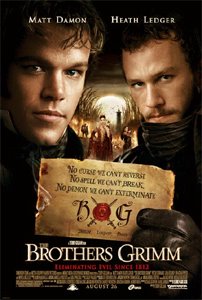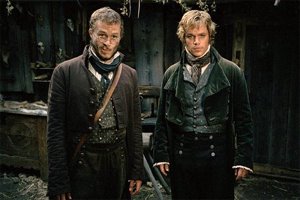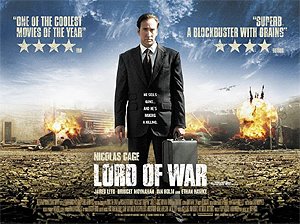Saturday, February 18, 2006
Why It Sucks To Be A Good Netflix Customer
That is, until you become too good of a customer.
Under Netflix's business model, they make more money off of people who don't order that many movies a month because they're spending less on postage. For people like me, they have to spend more per month so they don't like me as much.
So, what do they do? It's called "throttling" and they slow the throttle back on active customers.
What does this mean? It means you don't get first dibs on movies when they're released. They go to the less active customers... they want to keep them happy. The really active customers, we're more overhead and they don't make as much off of us, so they don't care if we have to wait.
Below is a screen capture of the top seven movies I have waiting in my Netflix Queue.
As you can see, six of the seven are not readily available to me. Granted, I currently have 84 movies in my queue, including some Christian films, a lot of film noir, a series of six DVDs from a TV show and a lot of other more obscure films. So, the movies will keep on coming.
But, I can't help but get a little peeved. I've been thinking of cancelling my account and starting a new one in my wife's name. Then, I wouldn't have a history of an active user and wouldn't be "throttled" back because I use the service a lot.
But, in reality, I shouldn't have to.
What happened to the days of actually REWARDING good customers? I used to do nothing but sing Netflix's praises.
Now? Well, I posted this blog entry. 'Nuff said.
Friday, February 17, 2006
The Brothers Grimm (2005)
 The Brothers Grimm is a wonderfully inventive and imaginative fictionalization of the history of how Will and Jake Grimm came into possession of Germanic fairy tales for which they later made famous.
The Brothers Grimm is a wonderfully inventive and imaginative fictionalization of the history of how Will and Jake Grimm came into possession of Germanic fairy tales for which they later made famous.In real life, the Grimm brothers traveled across Germany to document and later publish versions of local fairy tales. In this fun, fictional account, the Grimm brothers, played by Matt Damon as Wilhelm Grimm and Heath Ledger as Jacob Grimm, are conmen who prey on village superstitions with false, theatrical “exorcisms” to rid the village of their curses and their money. They run into unexpected trouble when they are called to solve the mystery behind a German village where children have been disappearing and the suspicious curse may be the real culprit.
Both actors are excellent and disappear into their roles, especially Ledger, as the more intellectual Jacob, who more openly weighs the possibility that true supernatural events can actually occur. And Damon's British accent is right on the money.
 The script, written by Ehren Kruger, does a superb job of intertwining almost every fairy tale you can imagine into the story. There are references to Jack and the Beanstalk, Cinderella, Sleeping Beauty, Rapunzel, Hansel and Gretel, Red Riding Hood and many, many more. You see the fictional inspirations for the eventual Brothers Grimm fairy tales.
The script, written by Ehren Kruger, does a superb job of intertwining almost every fairy tale you can imagine into the story. There are references to Jack and the Beanstalk, Cinderella, Sleeping Beauty, Rapunzel, Hansel and Gretel, Red Riding Hood and many, many more. You see the fictional inspirations for the eventual Brothers Grimm fairy tales. The film is directed by Terry Gilliam who’s odd visual style fits perfectly with the piece. In the Grimm fairy tales, there is always a true sense of dread, where children were actually in peril, and Gilliam conveys an effective sense of that dread throughout the movie. Characters are a little unstable and unpredictable. The danger is real and disturbing. He truly captures the waking-nightmare feeling that the original Grimm tales conveyed.
The film is directed by Terry Gilliam who’s odd visual style fits perfectly with the piece. In the Grimm fairy tales, there is always a true sense of dread, where children were actually in peril, and Gilliam conveys an effective sense of that dread throughout the movie. Characters are a little unstable and unpredictable. The danger is real and disturbing. He truly captures the waking-nightmare feeling that the original Grimm tales conveyed.The Brothers Grimm is a wonderfully odd and unsettling, funny and intriguing film. Check it out if you can.
Thursday, February 16, 2006
Suffering Souls
I’ll admit I don’t have a lot of answers, but I have a couple of thoughts on it. Maybe, together, we can getter a better understanding of it all.
First, I believe that free will is the catalyst for all that is evil. There is God’s will and free will. And that gift of free will is the only thing in the universe for which he does not already possess.
So, with that gift we have to decide, perhaps a thousand times a day, what we will do, which path we will follow, God’s path or our own path. And whenever we don’t choose God’s path, evil is allowed to exist.
So, why do bad things happen? Sometimes because our free will has allowed it to happen.
Let’s say there’s a young teen that’s at a party in high school and is offered illegal drugs. He can take a hit or not. It’s his decision, his free will. He takes a hit. A few years later, in college, he’s gotten involved in heavier drugs. Later on he’s addicted. He loses his job. He loses his marriage. He is forced into other illegal activities to feed his addiction. He ends up buying a gun. He ends up using it while holding up a convenience store, killing the mother of two behind the counter.
The parents or relatives of the mother of two ask… God, why did you let this happen? The answer is, he didn’t. There were a million moments of free will that led up to that awful event. And none of them had to do with God’s will.
The reality is that we each have a unique journey, a unique path filled with opportunities to follow God’s path or our own path. All of those paths overlap and interact and are interconnected.
But what about natural disaster? Free will didn’t cause a Tsunami or Hurricane Katrina. Well, some global warming believers will tell you that it did, but still, why does God allow natural disasters to occur?
That’s a good question. Maybe because it is all part of God’s pallet.
What I mean is that we are very limited creatures. Our brains can only understand so much and our ways to interact are primarily limited by the only thing we control… the way we communicate, either by writing, touch, body language, speech, etc. And we, arrogantly so, expect God to communicate in the miniscule way in which we can readily comprehend. We expect God to “speak to us.”
But, we are so limited. Why would God only “speak to us” through our feeble ways? Our pallet only contains colors which are merely similar shades of the same gray. Where, by comparison, God’s palette has an infinite number of colors available to him.
God is not limited in communicating through words, written or spoken, or body language or touch. For he controls everything. He created all of us and everything around us, “seen and unseen,” from the amoeba to our pets to our planet to galaxies to the infinite universe. So, maybe God communicates with us through things other than words or writing or body language. Maybe he is speaking to us through the totality of his creation. The wind is part of his creation, why can’t he use that to make a point. Or water. Or tectonic plates. Or low pressure systems. Or cold fronts or tornadoes or earthquakes or blizzards.
Maybe he's speaking to us everyday... and we just don't comprehend it.
Or maybe he’s much more passive than that. Maybe he’s developed this interacting, interdependent environment in which we can live and the price of living here is the random nature of it all. Maybe a hurricane hits simply because the ten thousand variables in play made it hit when it did, with the strength it did and God wasn’t really guiding it at all.
Maybe that’s part and parcel of being alive on this planet.
And what about illnesses, like cancer or tumors or other terminal illnesses? Well, some of those may be tied to free will. The choice to begin smoking in middle school may lead you to cancer at sixty-three. Then again, some of us are simply born more susceptible to one illness or another. Sometimes, that's just part of our creation.
And sometimes free will has nothing to do with it, like when a child develops leukemia or is born with life-threatening birth defects. Why would God allow that to happen?
I think the day we can look into the eyes of a terminally ill child and understand the reason behind it is the day we have left this planet and are in the presence of God himself. Because, using the limited brain power available to us, I don’t think we could ever comprehend a good reason for that.
But God does.
And I guess that is where faith comes in. Maybe that’s the reason for all suffering. Maybe they are opportunities of faith. Maybe they are chances for us to place our life in his hands, to fully trust in his path for us and the ones we love, even if the outcome hurts. Maybe suffering exists simply because it is a catalyst for people to pray, some of whom would not normally do so.
Maybe...
In the end, after all of this time and effort, the reality is that I don’t really know.
But, I find comfort in knowing that God does...
And maybe... that should be enough.
Who Visits?
So, if you read this blog, could you please either post a Hello in the Comments Section or send me an email to pbauer@hotmail.com and put BLOG in the Subject heading... just so I can see who's stopping by on occasion.
Thanks! And have a great Valentines Day!
Wednesday, February 15, 2006
MovieBeam On-Demand
One of the business model challenges was how to get those movies to you in a timely manner. Some have them being downloaded over phone lines, others via DSL or other broadband internet connection.
A new endeavor, called MovieBeam, is a set top box with 160 gig hard drive that connects to your TV preloaded with 100 movie titles. If you want to watch a movie, you pay once per movie and can watch it as many times as you want within 24 hours. You get automatically billed to a credit card once a month for each movie you watch.
How the movies get to your set top is pretty interesting... MovieBeam doesn't need an internet connection. Instead, it has a digital antenna that you simply hide behind the entertainment center and new movies are downloaded to your set top all the time. It makes it truly on-demand. And new movies are said to be available at the same time they are available for rental in video stores.
Pretty cool stuff.
This is just one of the options being thrown out there. The on-demand world has not been defined yet. It'll be interesting which business model ends up being the standard.
The Constant Gardner (2005)
 The Constant Gardner is a sloppy and ineffective thriller about major pharmaceutical companies “testing” drugs on unsuspecting populations in Africa. The film stars Ralph Fiennes as Justin Quayle, a member of the British High Commission located in Africa, and Rachel Weisz as Tessa Quayle, Justin’s wife, who uncovers the drug companies true plans.
The Constant Gardner is a sloppy and ineffective thriller about major pharmaceutical companies “testing” drugs on unsuspecting populations in Africa. The film stars Ralph Fiennes as Justin Quayle, a member of the British High Commission located in Africa, and Rachel Weisz as Tessa Quayle, Justin’s wife, who uncovers the drug companies true plans.All of the elements to make a great thriller are there… politics, large companies taking advantage of the innocent, bribery, lust, love, sacrifice... this movie should be something great, but it isn’t for two main reasons...
Reason one, the directing style. The film, directed by Fernando Meirelles, has a very invasive style, with a lot of close ups, handle held camera moves, quick cuts that move quickly between the past and the present… it’s a case where the style gets in the way of the story. Such a choice would have been effective if used in small doses, but to have 120 minutes of dizzying camera moves and cuts and out of focus shots just got in the way. It was downright irritating.
Reason two, the script. The screenplay, based on a book by John le Carre, does not take full advantage of the plot elements. The first problem is that the audience knows more than Fiennes for almost the entire film. Hitchcock uses this to great effect because the time between our having knowledge the main character does not is often brief. With this film, however, we wait a very long time for Fiennes to catch up. And, while you're waiting for Fiennes to figure out what you already know, you've spent that time figuring out what is going to happen after Fiennes knows... and that segues us into the biggest sin of the script, which is that we find out 99% of the secrets with about ½ hour to go in the movie… then almost nothing new is relayed. We’re just waiting for the film to end. There are no more surprises, nothing left in the tank. I'm like "end already!"
 On a personal note, the screenwriter couldn’t help but slide in a heavy handed anti-Bush, anti-Iraq war message at the very beginning. Weisz and Fiennes meet at one of his lectures and she goes off on this diatribe against the war and how the U.S. and Great Britain ignored the U.N. and went to war anyway. That, alone, didn’t bother me. Everyone has a right to their opinion.
On a personal note, the screenwriter couldn’t help but slide in a heavy handed anti-Bush, anti-Iraq war message at the very beginning. Weisz and Fiennes meet at one of his lectures and she goes off on this diatribe against the war and how the U.S. and Great Britain ignored the U.N. and went to war anyway. That, alone, didn’t bother me. Everyone has a right to their opinion.What did bother me was that Fiennes character was supposed to be a member of British politics and could have easily mentioned that the dissenting U.N. votes against the war did so, not because they were against the war, but because they were taking bribes from Sadam. Or he could have mentioned that an Iraqi General verified that all of the WMDs were moved into Syria prior to the war… Fiennes character could have said anything in defense of his government’s actions, but he doesn’t. And that just seemed like another one of Hollywood’s knives thrown into the backs of the majority of the country that supported the war.
To continue this off-topic tangent, if you ever watch Law and Order, they are very good about quickly mentioning both sides to a hot topic then pushing it aside to let the rest of the story unfold. Here, the screenwriter presented only one opinion... and an uninformed one at that. Maybe that was on purpose. Maybe I'm reading too much into it. It's possible.
In any event, the script, Weisz, editing and score are all up for Oscar consideration. Out of the four, I think the script is not due such an honor due to the underutilization of the excellent plot elements available to it.
With great films, you find yourself thinking about the movie long after it’s over, find new ways that it moved your or effected you. With The Constant Gardner, the more I thought about it, the more I disliked it. So I stopped thinking about it.
Too bad. It could have been great.
Tuesday, February 14, 2006
The History of St. Valentine's Day
The Origins of St. Valentine's Day
A quick quiz: St. Valentine was:
a) a priest in the Roman Empire who helped persecuted Christians during the reign of Claudius II, was thrown in jail and later beheaded on Feb. 14.
b) a Catholic bishop of Terni who was beheaded, also during the reign of Claudius II.
c) someone who secretly married couples when marriage was forbidden, or suffered in Africa, or wrote letters to his jailer's daughter, and was probably beheaded.
d) all, some, or possibly none of the above.
If you guessed d), give yourself a box of chocolates.
Although the mid-February holiday celebrating love and lovers remains wildly popular, the confusion over its origins led the Catholic Church, in 1969, to drop St. Valentine's Day from the Roman calendar of official, worldwide Catholic feasts. (Those highly sought-after days are reserved for saints with more clear historical record. After all, the saints are real individuals for us to imitate.) Some parishes, however, observe the feast of St. Valentine.
The roots of St. Valentine's Day lie in the ancient Roman festival of Lupercalia, which was celebrated on Feb. 15. For 800 years the Romans had dedicated this day to the god Lupercus. On Lupercalia, a young man would draw the name of a young woman in a lottery and would then keep the woman as a sexual companion for the year.
Pope Gelasius I was, understandably, less than thrilled with this custom. So he changed the lottery to have both young men and women draw the names of saints whom they would then emulate for the year (a change that no doubt disappointed a few young men). Instead of Lupercus, the patron of the feast became Valentine. For Roman men, the day continued to be an occasion to seek the affections of women, and it became a tradition to give out handwritten messages of admiration that included Valentine's name.
There was also a conventional belief in Europe during the Middle Ages that birds chose their partners in the middle of February. Thus the day was dedicated to love, and people observed it by writing love letters and sending small gifts to their beloved. Legend has it that Charles, duke of Orleans, sent the first real Valentine card to his wife in 1415, when he was imprisoned in the Tower of London. (He, however, was not beheaded, and died a half-century later of old age.)
Monday, February 13, 2006
Fortune Cookie
So, I'm going to stop ordering Chinese... just kidding.
Physical and Spiritual Healing
In the first reading, from Leviticus in the Old Testament, talked about identifying people with skin diseases, especially leprosy, and how those people were removed to the outer fringes of society.
"He shall remain unclean as long as he has the disease; he is unclean; he shall dwell alone in a habitation outside the camp."
It's important to remember that people believed that such diseases were caused by sin, either their own or their parents'.
Then, in the Gospel of Mark, we hear how Jesus healed a leper. This healing has dual meaning. The first is that he healed him of his wounds. The second is that he healed him, or forgave him, of his sins, for they believed such diseases were the result of sin.
It's also a symbol of sin in our lives. As long as we are unclean, we are unable to reside in the community of God. But, through Jesus, if we are cleaned of our sin, we are able to live in God's presence.
The bible sometimes has really cool stuff in it, don't you think?
Sunday, February 12, 2006
Lord of War (2005)
The film also stars Ethan Hawke as Interpol Agent Jack Valentine, Bridget Moynahan as Cage's model/wife Ava Fontaine and Jared Lehto as Cage's brother Vitaly Orlov.
 The film is interesting in the detailed ways Cage's character was able to follow the letter of the law to get away with breaking the laws, while Hawke's character refuses to break the law to arrest Cage... they are polar opposites of morality.
The film is interesting in the detailed ways Cage's character was able to follow the letter of the law to get away with breaking the laws, while Hawke's character refuses to break the law to arrest Cage... they are polar opposites of morality.The film is enjoyable and educational in the way we follow Cage's character from his early beginnings to being king of illegal arms sales. Cage's character has to make some pretty drastic moral justifications to continue his work and continues selling arms, at the risk of losing everything, because "it's the only thing he's good at."
The overall effect of the film is disturbing, but not completely satisfying. Cage's character does very little growth in the story. From the time he begins selling Uzis to the time he's selling post-iron curtain Russian weaponry, his character remains relatively the same. Maybe that's the point. Maybe the point is that he's okay with his immorality and his role in the world. As a viewer, however, it makes the journey less satisfying.
I'm not saying he had to go through some moral awakening... I'm just saying that he should have changed in some way. When he doesn't, you're left asking "what was the point?"
A good film, but not a great one.






